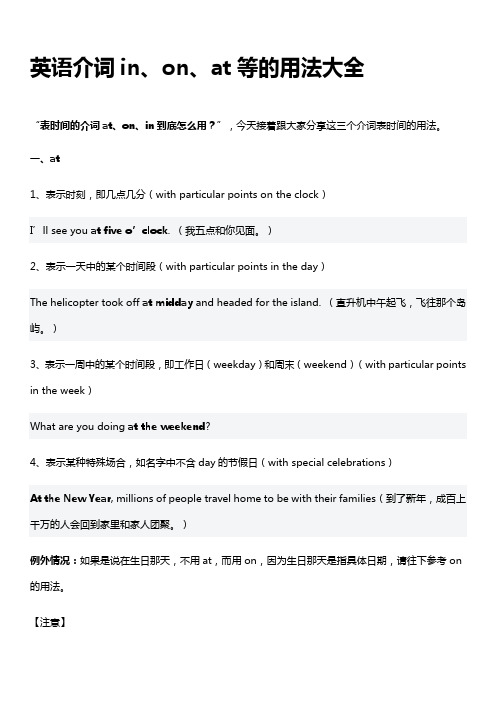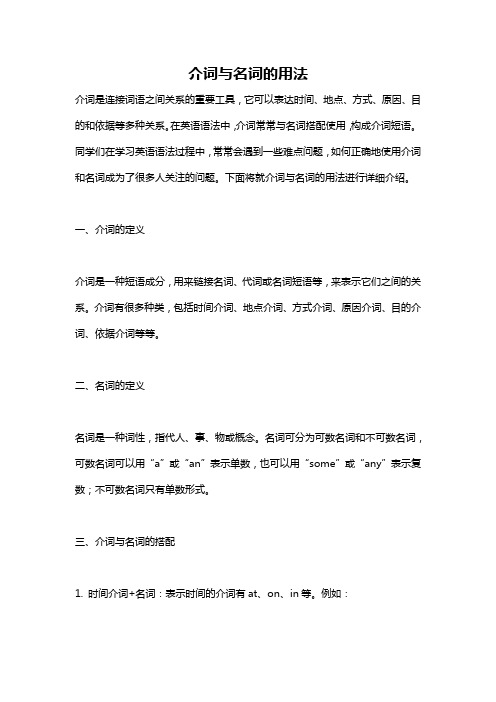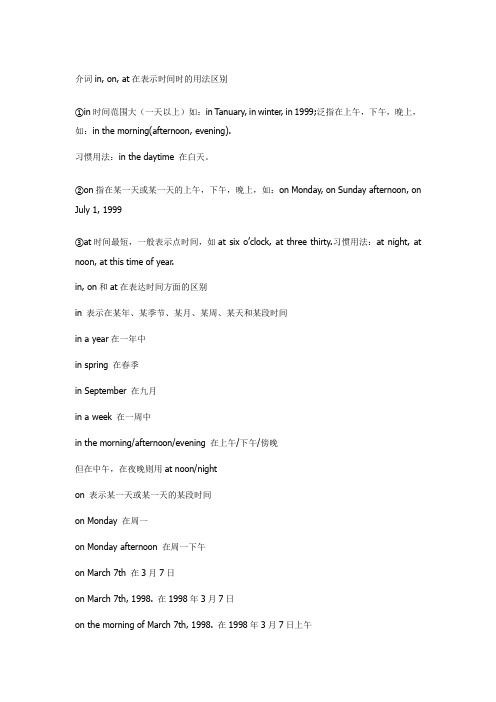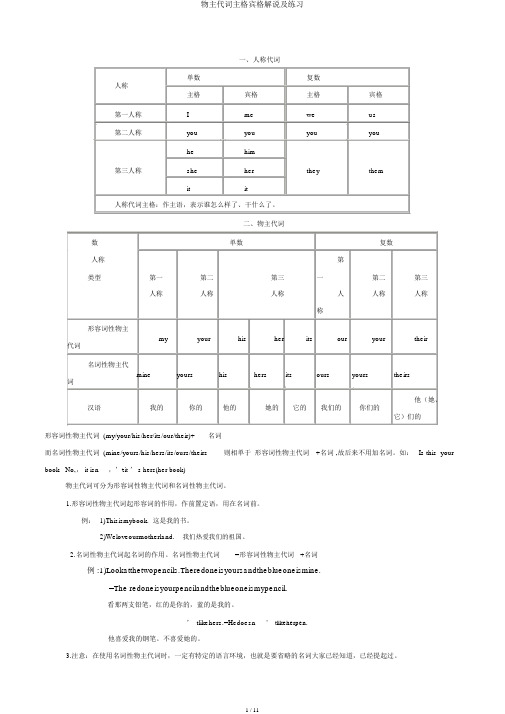At---in-on-在时间前的用法讲解及练习
英语介词in、on、at等的用法大全

英语介词in、on、at等的用法大全“表时间的介词at、on、in到底怎么用?”,今天接着跟大家分享这三个介词表时间的用法。
一、at1、表示时刻,即几点几分(with particular points on the clock)I’ll see you at five o’clock. (我五点和你见面。
)2、表示一天中的某个时间段(with particular points in the day)The helicopter took off at midday and headed for the island. (直升机中午起飞,飞往那个岛屿。
)3、表示一周中的某个时间段,即工作日(weekday)和周末(weekend)(with particular points in the week)What are you doing at the weekend?4、表示某种特殊场合,如名字中不含day的节假日(with special celebrations)At the New Year, millions of people travel home to be with their families(到了新年,成百上千万的人会回到家里和家人团聚。
)例外情况:如果是说在生日那天,不用at,而用on,因为生日那天是指具体日期,请往下参考on 的用法。
【注意】如果是用what time来提问,what time前面一般不用at。
如:What time are you leaving? (你几点走?)但是在口语中也可以这么问:At what time are you leaving?二、on1、用在日期前(with dates)We moved into this house on 2 October 1997. (我们是1997年10月2日搬进这栋房子的。
)2、用在星期的单数前(with a singular day of the week to refer to one occasion)I’ve got to go to London on Friday. (我周五就到伦敦了。
介词与名词的用法

介词与名词的用法介词是连接词语之间关系的重要工具,它可以表达时间、地点、方式、原因、目的和依据等多种关系。
在英语语法中,介词常常与名词搭配使用,构成介词短语。
同学们在学习英语语法过程中,常常会遇到一些难点问题,如何正确地使用介词和名词成为了很多人关注的问题。
下面将就介词与名词的用法进行详细介绍。
一、介词的定义介词是一种短语成分,用来链接名词、代词或名词短语等,来表示它们之间的关系。
介词有很多种类,包括时间介词、地点介词、方式介词、原因介词、目的介词、依据介词等等。
二、名词的定义名词是一种词性,指代人、事、物或概念。
名词可分为可数名词和不可数名词,可数名词可以用“a”或“an”表示单数,也可以用“some”或“any”表示复数;不可数名词只有单数形式。
三、介词与名词的搭配1. 时间介词+名词:表示时间的介词有at、on、in等。
例如:- at noon 在中午- on Monday 在星期一- in July 在七月份2. 地点介词+名词:表示地点的介词有in、on、at、under、above等。
例如:- in the park 在公园里- on the street 在街上- at the station 在车站3. 方式介词+名词:表示方式的介词有by、with、on等。
例如:- by car 乘坐车辆- with a smile 带着微笑- on foot 步行4. 原因介词+名词:表示原因的介词有because of、due to、owing to等。
例如:- because of the rain 因为下雨- due to illness 由于生病- owing to bad weather 由于恶劣的天气5. 目的介词+名词:表示目的的介词有for、to、in order to等。
例如:- for fun 为了娱乐- to study English 学习英语- in order to improve 为了改善6. 依据介词+名词:表示依据的介词有according to、in accordance with等。
介词in-on-at在表示时间时的用法

介词in, on, at在表示时间时的用法区别①in时间范围大(一天以上)如:in Tanuary, in winter, in 1999;泛指在上午,下午,晚上,如:in the morning(afternoon, evening).习惯用法:in the daytime 在白天。
②on指在某一天或某一天的上午,下午,晚上,如:on Monday, on Sunday afternoon, on July 1, 1999③at时间最短,一般表示点时间,如at six o’clock, at three thirty.习惯用法:at night, at noon, at this time of year.in, on和at在表达时间方面的区别in 表示在某年、某季节、某月、某周、某天和某段时间in a year在一年中in spring 在春季in September 在九月in a week 在一周中in the morning/afternoon/evening 在上午/下午/傍晚但在中午,在夜晚则用at noon/nighton 表示某一天或某一天的某段时间on Monday 在周一on Monday afternoon 在周一下午on March 7th 在3月7日on March 7th, 1998. 在1998年3月7日on the morning of March 7th, 1998. 在1998年3月7日上午at 表示某个具体时刻。
at eight o’clock 在8点钟at this time of the year 在一年中的这个时候at the moment 在那一时刻at that time 在那时注意:在英语中,如果时间名词前用this, last, next 等修饰时,像这样的表示,“在某时”的时间短语前,并不需要任何介词。
例如:last month, last week, this year, this week, next year, the next day, the next year 等。
物主代词主格宾格讲解及练习

一、人称代词单数复数人称主格宾格主格宾格第一人称I me we us第二人称you you you youhe him第三人称she her they themit it人称代词主格:作主语,表示谁怎么样了、干什么了。
二、物主代词数单数复数人称第类型第一第二第三一第二第三人称人称人称人人称人称称形容词性物主my your his her its our your their 代词名词性物主代mine yours his hers its ours yours theirs 词他(她、汉语我的你的他的她的它的我们的你们的它)们的形容词性物主代词 (my/your/his/her/its/our/their)+名词而名词性物主代词 (mine/yours/his/hers/its/ours/theirs则相单于形容词性物主代词+名词 ,故后来不用加名词。
如: Is this yourbook No,, it isn,’t it ’ s hers(her book)物主代词可分为形容词性物主代词和名词性物主代词。
1.形容词性物主代词起形容词的作用,作前置定语,用在名词前。
例:1)Thisismybook. 这是我的书。
2)Weloveourmotherland.我们热爱我们的祖国。
2.名词性物主代词起名词的作用。
名词性物主代词=形容词性物主代词+名词例 :1)Lookatthetwopencils.Theredoneisyoursandtheblueoneismine.=The redoneisyourpencilandtheblueoneismypencil.看那两支铅笔,红的是你的,蓝的是我的。
’ tlikehers.=Hedoesn’ tlikeherpen.他喜爱我的钢笔。
不喜爱她的。
3.注意:在使用名词性物主代词时,一定有特定的语言环境,也就是要省略的名词大家已经知道,已经提起过。
例:It ’shers是.她的。
时间介词In、on、at的课堂讲解与练习

时间介词In、on、at的课堂讲解与练习介绍本文将讲解英语中常用的时间介词In、on、at的用法,并提供相关练。
In的用法- 用于表示某个时间段内,常与年、月、季节、早晨、下午、晚上等词连用。
- 例如:in 2022, in August, in summer, in the morning, in the evening- 用于表示将来的某个时间段。
- 例如:in two weeks, in the near futureOn的用法- 用于表示某一天、日期、星期等具体的时间点。
- 例如:on Monday, on January 1st, on Christmas Day- 用于表示某个特定的节日。
- 例如:on New Year's Day, on Easter SundayAt的用法- 用于表示具体的时刻。
- 例如:at 8 o'clock, at noon, at midnight- 用于表示某个特定的时间点。
- 例如:at sunrise, at sunset练请根据上述介绍,填入适当的时间介词。
1. I will meet you at the park on Sunday.at the park on Sunday.2. The party will be held in the evening on New Year's Eve.in the evening on New Year's Eve.3. She was born in September at 10 o'clock in the morning.in September at 10 o'clock in the morning.4. We usually go skiing in winter at the weekend.in winter at the weekend.5. The concert will start at 8:30 PM on Friday.at 8:30 PM on Friday.总结通过研究In、on、at的用法,我们可以更准确地表达时间。
七年级上册英语地点介词at,in,on用法及练习

七年级上册英语地点介词at,in,on用法及练习七年级上册英语地点介词at,in,on用法及练地点介词是英语语法中的一部分,用于描述人或事物的位置。
在这篇文档中,我们将讨论七年级上册英语中常见的地点介词:at,in和on的用法。
同时,我们也将提供一些练题来帮助你巩固所学内容。
1. at的用法- 用于表示具体的位置或地点,例如:- at school (在学校)- at the park (在公园)- at the bus stop (在公交车站)- 用于表示具体的时间点,例如:- at 9 o'clock (在九点)- at lunchtime (在午餐时间)- at night (在晚上)2. in的用法- 用于表示大的地点范围,例如:- in Beijing (在北京)- in the park (在公园)- in the classroom (在教室)- 用于表示季节、月份、年代等时间段,例如:- in summer (在夏季)- in October (在十月)- in the 1990s (在上世纪九十年代)3. on的用法- 用于表示具体的表面或平面,例如:- on the desk (在桌子上)- on the wall (在墙上)- on the floor (在地板上)- 用于表示具体的日期或星期几,例如:- on Monday (在星期一)- on June 1st (在六月一日)- on New Year's Day (在元旦)练题:填入适当的地点介词(at, in, on)来完成下列句子:1. I will meet you ___ the library.2. The cat is ___ the table.3. We have a class ___ 9 o'clock.4. They are playing soccer ___ the park.5. The party is ___ Friday night.答案:1. at2. on3. at4. in5. on希望本文对你理解七年级上册英语地点介词的用法有所帮助。
时间介词at,in,on用法及练习

时间介词(at, in’on)的用法与练习1.at指时间表示:(1)时间的一点、时刻等。
如:They came home at sunrise (at noon, at midnight, at ten o'clock, at daybreak, at dawn).(2)较短暂的一段时间。
可指某个节日或被认为是一年中标志大事的日子。
如: He went home at Christmas (at New Year, at the Spring Festival, at night).2.in指时间表75:(1)在某个较长的时间(如世纪、朝代、年、月、季节以及泛指的上午、下午或黄昏等)内。
如:in 2004, in March, in spring, in the morning, in the evening, etc(2)在一段时间之后。
一般情况下,用于将来时,谓语动词为瞬间动词,意为“在 . 以后如:He will arrive in two hours.谓语动词为延续性动词时,in意为“在......以内气如:These products will be produced in a month.注意:after用于将来时间也指一段时间之后,但其后的时间是“一点”,而不是“一段"。
如:He will arrive after two o'clock.3.on指时间表示:(1)具体的时日和一个特定的时间,如某日、某节日、星期几等。
如:On Christmas Day (On May 4th) , there will be a celebration.(2)在某个特定的早晨、下午或晚上。
如:He arrived at 10 o'clock on the night of the 5th.(3)准时,按时。
如:If the train should be on time, I should reach home before dark.练习( )1. Children get gifts ____ Christmas and ____ t heir birthdays-A. on; onB. at; onC. in; inD. in; on( )2.——There is nothing _____ tomorrow afternoon, is there? ------- No. We can have a game of table tennis.A. onB. in C- out D. up( )3. A lot of students in our school were born _____ March, 1981 .A. inB. atC. onD. since( )4. He suddenly returned ____ a rainy night.A. onB. atC. inD. during( )5. My grandfather was born ___ Oct. 10, 1935.A. onB. in C ・ at D. of()6. The train is starting ____ f ive minutes. A. in B. at C. for D. still ( )7. Mike does his exercises ____ seven _____ the evening.A. on; toB. at; inC. by; ofD. at; on( )8. Children wake up very early ____ the morning of Christmas Day.A. inB. onC. forD. at( )9 ____ a cold winter morning, I met her in the street.A. InB. OnC. AtD. For( )10 It happened to be very cold ____ the morning of our sports meeting.A. atB. onC. withD. of( )11. Why did you get up so early __ this morning.A. onB. /C. atD. in( )12. He went to Shanghai ___ September 3, 1991 and came back ____ a cold morning last year.A. in; onB. on; inC. on; onD. in; in( )13. Lucy was born ___ the night of May 12, 1984 .......A. onB. inC. atD. to( )14. Mrs Brown came to China ____ 1996.A.onB. ofC. to,D. in( )15 ___ the morning of November 20, 1915, the workers came to Chicago to show their mourning of Joe Hill.A. OnB. InC. OnD. At ()16. Ann moved — Hangzhou _____________ September, 1992.A. /; inB. to; inC. to; on D, in; in ()17. They started off ___ a n autumn afternoon.A. duringB. atC. inD. on ()18. He often goes. ___ school ___ six thirty __ the morning.A. for; to; inB. to; at; inC. to; for; at D, for; at; to ()19. He arrived —Shanghai _____________ 9: 30 ___ March 5.A. at; in; atB. to; on; atC. in; on; atD. in; at; on ()2O.The English teacher told me to get there ___ .half past ten.A: in B. at C. on D. of答案:B AAAA AB B B B BCADB ADB DB。
时间介词in,on,at用法练习答案解析

时间介词: in/on/atA. onB. atC. toD. in参考答案: D“年”前面用介词 in ,故正确答案为 D。
A. inB. onC. atD. to参考答案: A“月份”前面用介词 in ,故正确答案为 A。
A. atB. onC. inD. to参考答案: C“季节”前面用介词 in ,故正确答案为 C。
A. inB. atC. onD. of参考答案: B“时间点”前面用介词 at,“half past ten”是时间点,故正确答案为 B。
A. to; inB. at; inC. for; atD. at; to参考答案: B“时间点”前面用介词 at,在“早上”前面用 in ,故正确答案为 B。
My grandfather was born ______ Oct. 10, 1935 . (on/in)参考答案: on“具体到某一天”用介词 on ,故该空应填on 。
______ a cold winter morning, I met her in the street . (on/in)参考答案: on“具体到某一天的早上”用介词 on ,该句具体到了“在一个寒冷的冬天的早上” ,因此应该用介词 on 。
8 选择适当的单词填空They started off ______ an autumn afternoon . (on/in)参考答案: on“具体到某一天的下午”用介词 on ,该句具体到了“在一个秋天的下午” ,因此应该用介词 on。
A. onB. atD. during参考答案: A“具体到某一天晚上”用介词 on ,该句具体到了“在一个下雨的晚上” ,因此应该用介词 on ,故正确答案为 A。
A. in; onB. on; inC. on; onD. in; at参考答案: C“September 3, 1991”具体到了某一天,因此应该用介词 on ,“a cold morning”具体到了某一天的早上,因此也应该用介词 on ,故正确答案为 C。
